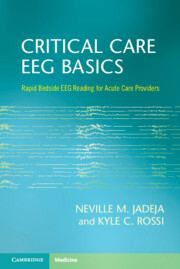Book contents
- Critical Care EEG Basics
- Critical Care EEG Basics
- Copyright page
- Dedication
- Contents
- Foreword
- Preface
- Acknowledgments
- How to Read This Book
- Part I Introduction
- Part II Case-Based Approach to Specific Conditions
- Chapter 9 Nonconvulsive Status Epilepticus (NCSE)
- Chapter 10 Management of the Ictal‐Interictal Continuum (IIC)
- Chapter 11 Seizures and Epileptiform Discharges
- Chapter 12 Seizure Mimics
- Chapter 13 Focal Lesions
- Chapter 14 Encephalopathy
- Chapter 15 Coma
- Appendix Understanding EEG Reports
- Index
- References
Chapter 9 - Nonconvulsive Status Epilepticus (NCSE)
from Part II - Case-Based Approach to Specific Conditions
Published online by Cambridge University Press: 22 February 2024
- Critical Care EEG Basics
- Critical Care EEG Basics
- Copyright page
- Dedication
- Contents
- Foreword
- Preface
- Acknowledgments
- How to Read This Book
- Part I Introduction
- Part II Case-Based Approach to Specific Conditions
- Chapter 9 Nonconvulsive Status Epilepticus (NCSE)
- Chapter 10 Management of the Ictal‐Interictal Continuum (IIC)
- Chapter 11 Seizures and Epileptiform Discharges
- Chapter 12 Seizure Mimics
- Chapter 13 Focal Lesions
- Chapter 14 Encephalopathy
- Chapter 15 Coma
- Appendix Understanding EEG Reports
- Index
- References
Summary
This chapter describes the diagnosis, types, and management of nonconvulsive status epilepticus using a case-based approach. Generalized status epilepticus including nonconvulsive status epilepticus (NCSE) is a medical emergency that is best managed in an intensive care unit with continuous EEG monitoring. Refractory status epilepticus (RSE) is defined as the failure of seizure activity to terminate despite initial benzodiazepines and additional intravenous antiseizure medications. Refractory status epilepticus is an indication for intravenous anesthetics such as midazolam and propofol with the goal of titrating to burst suppression. Highly epileptiform bursts seen are associated with status epilepticus recurrence despite treatment with intravenous anesthetics, a condition known as super-refractory status epilepticus (SRSE). Additionally, this chapter also describes how to recognize status epilepticus cessation and an uncommon form of NCSE called absence status epilepticus.
Keywords
- Type
- Chapter
- Information
- Critical Care EEG BasicsRapid Bedside EEG Reading for Acute Care Providers, pp. 123 - 143Publisher: Cambridge University PressPrint publication year: 2024

